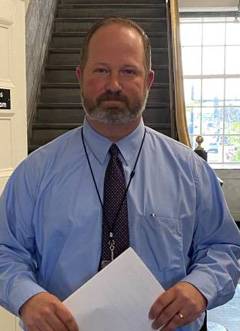Additional $2M toward county's third-phase water project 'certainly helps'
Water is one of those things that doesn’t evoke much interest until the well runs dry, and county officials have been steadily working on a plan to ensure that doesn’t happen, they say.
And that doesn’t happen without funding, which will be needed for the upcoming $150 million third phase.

“We are currently designing and evaluating the needed improvements for Phase 3, which brings 7.6 million gallons more per day. This quantity of water was intended to replace the City of Batavia Water Treatment Plant production. Part of this transition requires a Source Supply Change Study to make sure water chemistry does not cause issue in the city’s old pipes and services,” county Highway Superintendent Tim Hens said. “This study is intensive and will take approximately three years to complete. During this time, we will continue to design the overall Phase 3 project. There are parts and pieces within Monroe County that are not controlled by the Source Supply Study that will advance ahead. The county is continuing to seek federal and state funding to complete the project that has a total estimated cost of $150 million.”
Some good news came this month in the form of a $2 million grant from Senator Kirsten Gillibrand’s Office. That money will go towards a new water tank on North Road in Le Roy, County Manager Matt Landers said. While there’s still much more expense to go, it “certainly helps,” Landers said, and is “$2 million less that we have to borrow and pay interest on.”
As for how to pay for the remaining project?
“We are certainly hopeful for future grant assistance. We recently submitted for a $30 million Water Infrastructure Improvement grant with NYS and submitted for $1.7 million in Congressional earmark funding through Congresswoman Tenney’s Office,” Landers said. “We plan on submitting annually to both NYS and the federal government for as long as phase 3 is being designed and constructed.

“We are searching for federal and state grants, expecting to raise some of the funds through a bond issuance and having a small increase in the water rate to cover the rest,” he said. “In addition to the $2 million recently announced, we are also applying $8 million of federal ARPA funding towards phase 3. We have not paid for phase 3 yet because it is still being designed.”
Remember those county press releases reminding residents to temper their water use during summer months? Those reminders, and the need for spray parks in Batavia and Le Roy to be closed temporarily this summer, are all related to city and county water infrastructure issues and the rising need for water, officials say.
“Demand continues to outpace water supply, and this trend will only get worse in the coming years,” Landers said. “Clean reliable water is essential from both a public health standpoint and from an economic development perspective."
There haven’t been any reminders lately about restricting water use, so does that mean the situation is better?
“Recent repairs at the City water plant (repair of a well pump and replacement of a low service pump) have helped supply keep close with demand,” Landers said. “In addition, the county is moving away from the peak demand season, which will relieve some of the pressure on the city water plant.”
